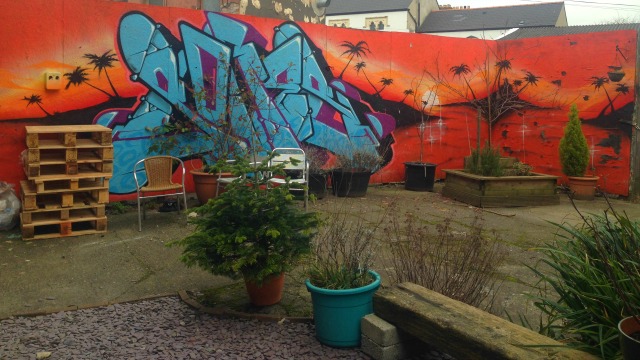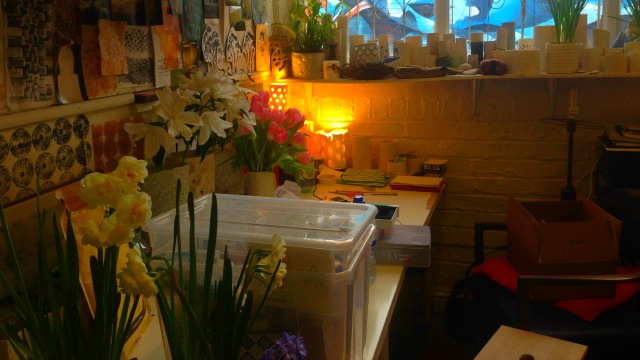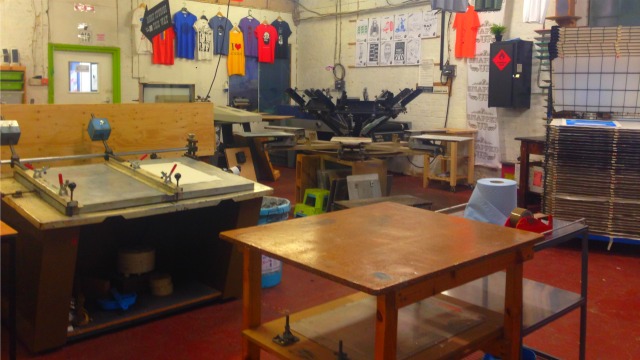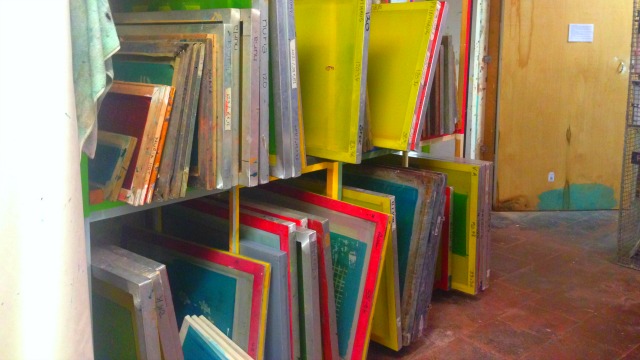With Cardiff Council threatening to cut arts budget, an arts collective is finding new ways of funding.

You smell a bit of car exhaust fumes mixed with tinges of biting pine fragrance. It has to be paint. As the steel door squeaks open, you see a coffee bar to your left and reconstructed wooden benches to your right. You’re still unsure on what kind of place this is as you walk through the corridor and see ceramic installations, a pink mannequin with only a T-shirt on, and sporadic pieces of artworks on the walls.
“We started in 2010, so we’ve been here for six years and we were in this building for about a year and a half before that,” says Jude Lau, co-founder of The Printhaus, a screen-print workshop and arts collective in Cardiff.
The mishmash of things is exactly how they envisioned the place to be—rooms used by artists as their studios, a back garden connecting to the coffee bar area that serves as an events place for other forms of art, and the heart of the business: the communal space where the screen-print workshop is placed.

The Printhaus workshop started as a way to address the skills of young art students that the founders thought the artists lacked.
“We’d quite often get either current students or recent graduates wanting to come to print. And then, what we’d find is that there’s real lack of technical skill, a real lack of professionalism of how to work on professional print studios—something that’s not taught in university,” says Jude.
As the number of artists joining the collective grew, whether they’re trying out screen-printing as a member of the workshop or there as an artist renting out one of the studios, it has formed a tight community of creative individuals whose energies are infinitely infectious.
Lydia Niziblian, a jewelry-maker who rents a workspace at the collective, says: “We all get on well, there’s a proper little Printhaus family that is always growing, and there is always someone working on something interesting. Everyone works in different disciplines, and in a different way, so there is a great creative vibe there. Everyone is supportive of each other.”
With the amount of support that the artists get from each other, sustainability of The Printhaus through revenues from the collective is always relatively calmer than those art spaces that depend on their existence from government funding.
“I actually spoke to another print workshop, Cardiff Print, who is entirely sustained by funding from the arts council and the Cardiff council. Their site at Splott is owned by Cardiff city council and they’re constantly under threat of being shut down,” says Jude.

Jude also recalls the shutting down of another well-loved art gallery in Cardiff, The Abacus, which previously had its own agreement with the city council on low rate rent.
“The reason why they were kicked out was that Boots put a bid to the council to say that they would like the space and obviously, the council wasn’t going to turn down full rates and full rent.”
While The Printhaus can opt for the company to be a moneymaking machine by just renting out their studio spaces, Jude asserts that the combination of the workshop and the studios are really important. What they do in the workshop is to look after residents, give guidance to artists, and lend a hand when needed.
Geoff Hartwright, a member of The Printhaus who does large poster screen printing, says: “The facilities are extensive, and advice is usually available. Plus you can always “buy time” with a staff member for bigger projects.”

The Printhaus’ tutors are also what Lydia likes most about the collective. She shares that the people are very generous with giving advice, not withholding knowledge that art practitioners tend to do.
“In any arts discipline, you tend to come across people who very jealously guard the technical knowledge they have. I’ve never seen any evidence of that at Printhaus, everyone knocks ideas around off each other, and there is always someone willing to help you out when you get stuck or need a hand.”
